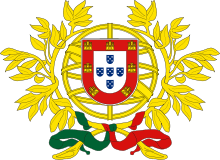Bangladesh–Portugal relations
Bangladesh |
Portugal |
|---|
Bangladesh–Portugal relations refer to the bilateral relations between Bangladesh and Portugal.
History
The Portuguese first arrived in Bangladesh during the 16th century. They had many trade posts in Bengal and used to control the thriving sea port at Chittagong. After subsequent wars against the Arakans and the Mughals, the Portuguese lost their control over Chittagong in the 17th century. However, their descendants still live in the old parts of the city. The Portuguese missionaries were the forerunner in expanding Christianity in Bangladesh.[1]
High level visits
Former foreign minister of Bangladesh Dipu Moni paid an official visit to Lisbon in 2010.[2]
Economic cooperation
Bangladesh and Portugal have shown their deep interest to expand the bilateral economic activities between the two countries and have been taking necessary steps in this regard.[3] In 2010, the two countries signed an agreement on avoidance of double taxation.[4] Both the countries have emphasized on the necessity of interaction between the business communities of the two countries through exchange of business delegations.[5]
Bangladeshi diaspora in Portugal
As of 2012, there are about 15,000 Bangladeshi expatriates working in Portugal.[6]
References
- ↑ Ray, Aniruddha (2012). "Noakhali Sadar Upazila". In Islam, Sirajul; Jamal, Ahmed A. Banglapedia: National Encyclopedia of Bangladesh (Second ed.). Asiatic Society of Bangladesh.
- ↑ "Portugal urged to support Dhaka's cause within EU". The Independent. Retrieved 22 February 2014.
- ↑ "Press remains free under emergency". The Daily Star. Retrieved 22 February 2014.
- ↑ "Bangladesh-Portugal agree to avoid double taxation". Bangladesh Business News. Retrieved 22 February 2014.
- ↑ "Bangladesh to open mission in Lisbon". The Daily Star. Retrieved 22 February 2014.
- ↑ "President for opening new missions in potentials countries". Bangladesh Sangbad Sangstha. Retrieved 22 February 2014.

